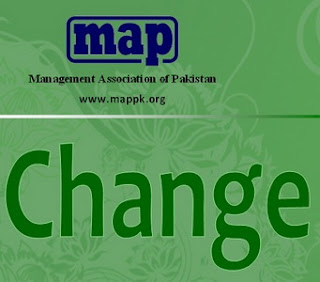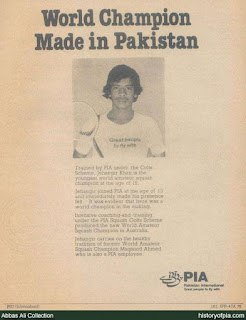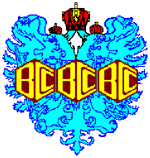Management Association of Pakistan’s (MAP) 16TH Convention Theme ‘re-Think Management’ Productive Affair
MAP RE-THINKS THE PLOT; STRESSES SHARPENING OF BOTH BRAIN AND BRAWN
(Report filed by Adil
Ahmad)
While the emphasis will always be on getting it right first
time every time, there is clearly a lot of merit in declaring a time-out and
revisiting established premises with an open mind and search for space to
rethink, reinvent and innovate with a view to leaving this world a better
place. The Management Association of Pakistan, MAP for short, put on its 16th
Convention with the father of mind-mapping Tony Buzan as the main draw. Voice
coach Lucy Cornel and life coach Dr. Zsu Fajcsak were the other two who braved
scary travel advisories to grace our shores.
On the Pakistani front the list of speakers was impressive
as well. Veteran marketing man Syed Masood Hashmi, MAP’s Vice President, played
the host in the absence of the MAP President Saadia Naveed. Representing
English Biscuit Manufacturers (EBM), the ‘Founding Partner’ of the MAP
Convention, was Dr. Zeelaf Munir, EBM’s Chairperson & Executive Member
Board of Directors.
Amongst the weighty speakers and panelists were Khalid Awan
(Chairman TCS), Wajahat Husain (President & CEO, UBL),Sirajuddin Aziz (President
& CEO, Habib Metropolitan Bank), Nadeem Naqvi (Managing Director, Karachi
Stock Exchange), Asif Jooma (CEO, ICI), Kimihide Ando (CEO, Mitsubishi Corp
Pakistan), Furqan Qureshi (CMO, PTCL), Ali Hasnain (Head of Retail Banking,
UBL), Lucy Cornel (Chief Inspiration Officer, VoiceCoach), Etsko Schuitema
(Founder & Leading Partner, Schuitema Associates), Naila Kassim (Head of
Corporate Communications & HR, Engro Corp), Pouruchisty Sidhwa (Director
HR, GSK), Naeem Zamindar (Chairman & Founding Volunteer Teacher, Art of
Living Foundation), and Dr. Zsu Fajcsak (Founder & Director, Alive
International).
Octara’s lead consultant Dr. S.A. Rab served as the master
of ceremonies, and opened proceedings with the declaration that the objective
on this day was to seek sanity in the midst of chaos. Further elaborating the
object, MAP Vice President Syed Masood Hashmi said that the intention was to
celebrate modern and best management practices that would enable adapting to
change. Syed Wajahat Hussain, the President and CEO of Platinum Sponsors United
Bank Limited, termed HR as the most important factor in any progressive and
dynamic organization, saying that the continuous review of management has
allowed UBL to differentiate itself from its competitors.
DAYDREAMING THE FUTURE
Dr. S.A. Rab then introduced the Keynote Speaker Tony Buzan,
the Inventor of Mind Maps, the recipient of the inaugural gold medal of the
Avicenna Society, whose topic ‘re-Think: Innovation – It’s all in the thinking’
appeared fairly self-evident. Tony Buzan is a champion of radiant thinking and
the use of colours to aid retention. “Colours energize thinking, they inspire
and enable creativity, they add life and fun to thinking,” said Tony, asking
how many present in the very large audience indulged in daydreaming?
“Daydreaming has been labeled as bad by school and society. When kids daydream
they use their imaginations to create solutions. Leonardo Da Vinci said one
must day dream, as also did Einstein. We use less than one percent of the
brain, leaving ninety-nine percent available for development. That’s wonderful
news!”
In Tony Buzan’s view we have been taught linearly, not
radiantly, while the brain thinks radiantly. Kindergarten kids score high on
creativity while senior school students score less, and adults score even less.
Creativity goes down with age. Creativity is the main thinking tool for problem
solving. The capacity of the human brain to generate thoughts is infinite.
“Energy into memory produces creativity,” said Tony Buzan,
with the advice to use it well by thinking well, and all will be well. Profound
and radiant thoughts indeed.
ANALYZING THE DISCONNECT
Next on the MAP Convention agenda was a panel discussion on
the topic ‘re-Think: Leadership Leading Minds’, with the heavyweights of the
corporate world assembled to share insights. Nadeem Naqvi (KSE), Dr. Zeelaf
Munir (EBM), Sirajuddin Aziz (HMB), Asif Jooma (ICI), Kimihide Ando (Mitsubishi
Corp), and Ali Hasnain (UBL) generated substantial food for thought.
Zeelaf flagged the recognizing of emerging patterns and
institutionalizing them, calling sustainability across the board the big issue.
Keep probing and keep asking questions, was her advice.
Kimihide advocated stepping back and re-thinking what went
wrong, and cultivating within oneself the ability to lead people who are
professionally better than you. He said we were living in a world where reality
and the ideal were contradictory, so a leader had to be realistic.
Ali was of the view that really motivated people was going home
with a sense of having achieved something, terming empowerment as central to
motivation. It should be okay to make mistakes, he said, advocating the
creating of a culture that celebrated innovation and experimentation.
Sirajuddin felt that the barrier to new thinking was the
leader’s inability to be a follower, with positional authority working only in
the short term. Discussion and debate amongst birds of a feather was necessary
to generate new leadership.
Nadeem said we all worked for someone else and the ‘seth’
called the shots. He flagged humility as being very important, and the need to
subsume oneself in the mission of the organization. Managing the shades of each
colour is what makes a leader, he said.
Asif said that family owned companies thrived on innovation,
while multinationals were slow and lumbering, and that if one hadn’t groomed a
successor then one had failed as a leader. Nobody was indispensible.
ENVISIONING A BRIGHT FUTURE
The panel discussion left the gathering deep in thought,
which was the idea, and as Dr. Rab took center-stage once more to emcee the
next item on the very full MAP agenda, the audience was seized with a renewed
sense of expectation. The topic was weighty and applied fully to the future of
Pakistan, and the speaker was a celebrated visionary who had walked his talk in
exemplary fashion. Khalid N. Awan, the Chairman of TCS, was up next, and his
topic was ‘re-Think: Creating Value – New World, New Entrepreneurs.’
Khalid N. Awan’s message radiated hope that dispelled the
air of doom and gloom caused by dismal ground realities that Pakistan
confronted. “Despite the present problems that we face the future for us is
very bright,” said he, emphasizing that there were phenomenal opportunities in
the problems that we faced today. “An entrepreneur is one who takes initiatives
and risks. Just imagine that just 0.3 percent of the Sahara desert’s solar
potential is sufficient to power the entire world. The natural human desire is
for progress. Despite the huge growth in the world’s population we can still
feed our people not withstanding a colossal amount of waste.”
He said that Malala had done the nation proud, and if Eidhi
had not been conferred the Nobel Peace Prize, then the Prize itself stood
diminished. He spoke of a Sindh Police bomb disposal expert whom he had met, an
ordinary and matter of fact person holding together the fabric of our society. Hope
for the future was in plentiful evidence in Pakistan, and all one had to do was
shift focus occasionally from the bad news to the good news, recharge, and go
back to addressing the bad news one more with increased vigor and
determination.
DAY OF THE BIG DATA
Next on Dr. Rab’s cue card to get on stage was the Chief
Marketing Officer of PTCL, Furqan Qureshi, speaking on the topic ‘re-Think:
Technology Get Smart.’ He dazzled the audience with a peep into what the future
would hold for Pakistan, starting with 360 Gigabytes, dawn of the age of ‘big
data,’ the significance of which was lost on non-techies like me still reliant
on pen and paper. That Pakistanis are the world’s 4th largest SMS
users didn’t really come as a surprise given our penchant for communicating.
Companies will outsource and people will work from home or be on the road, with
flexible working hours ruling the roost. There were 2.5 million broadband
customers in Pakistan, and the Internet-of-Things was upon us. The future will
hold zero privacy, and this will be a big issue. Furqan was with the good news
and the bad news all at once.
MAP Executive Committee Member Amir Abbasi presented the
mementos to Mr. Khalid Awan and Mr. Furqan Qureshi.
YOUR BREATH IS THE FUEL FOR YOUR VOICE
The Chief Inspiration Officer of Voice Coach, Lucy Cornell,
was up next on the topic ‘re-Think: Communications, New World, New Voice.’ Leadership
comes from a shared purpose, she said, pointing to connection and inspiration
through vocal communication. “If you’re not feeling it, they’ll not feel it,”
said Lucy, citing commitment, courage and energy as requirements to deliver the
message vocally.
Amidst
a lot of very good advice from her, what caught one’s attention is what Lucy
described as the ABV of Speaking. Arrive, Breathe, Vibrate. “When you arrive,
ensure that you get over the ‘speaking jetlag’ inherent in a business culture
that is full of distractions. The more present you are the more presence you
will have.”
Lucy says the Breath helps keep you in control and
makes for inspiration, and carries you from the inside to out. “Your
breath is the fuel for your voice. The power of the voice is that you can
literally vibrate your audience on a cellular level, and move them into action.
So the more generous you can be with your voice the more your listener is
likely to hear you and literally resonate with you. Your vocal birthright is to
have at least a four octave range, but most of us live in a one octave range,
particularly politicians. This is specially true if the culture you find
yourself in allows only for a restricted range of expressivity.”
MAP Executive Committee Member Mr. Talib Karim presented the
memento to Lucy Cornell.
PEOPLE, NOT EMPLOYEES
With Lucy Cornell exiting the stage to a resounding round of
applause, it was time for another panel discussion on the topic ‘re-Think: HR
Management – They’re not employees, they’re people!’ Moderated by Paul Keijzer
of Engage Consulting, the participants included Dr. Sunil Gupta (Chief Learning Officer - Ideas Management Consultants,
UAE), Lucy Cornell, Etsko Schuitema (Schuitema Associates), Naila
Kassim (Engro Corp), and Pouru Sidhwa (GSK).
Etsko fired the first broadside by stating that thinking of
people as resources was morally wrong and tantamount to cannibalism. “The
problem is not in the organization, but in the people,” he said, pointing to
intent as the place where the problem lay. “We must engage beyond our personal
interest. People don’t care about what you know. People care about if you care
for them. Are you here to make a contribution to the world? Or are you here to
brazenly promote your self-interest?”
Lucy added that in Australia it was not known as HR anymore.
Instead, it was known as Learning and Development or People & Culture. It’s
a different semantic which changes our approach to how we communicate. I work
with a lot of people who do not have a voice in the business. The only way to
change that is to get them engaged, and that will happen when someone higher up
in the business gives them permission to get engaged and have a voice. In my
work I engage with such people and help them get their voice heard by people in
the organization who matter. In terms of diversity, it’s about giving women all
over the world the opportunity to get their voice heard by the powers that be.
Naila said that a lot of the responsibility lay with the
employees, and if they didn’t bring the shift the management would not change
its attitude. She felt that a lot of young people were coming into the
workforce and bringing with them their own unique needs and ways of doing
things, making flexible working hours and agility in the workplace more and more
commonplace. Employers need to be sensitized to what the employees want,
because if they’re not then disgruntled employees will adversely affect the
organization’s productivity and bottom-line.
Pouru was of the view that companies and leaders who are resistant
to change inhibit their people from thinking and being entrepreneurial. “We are
all slaves to a feudal mindset and we think by saying ‘yes sir’ is going to
help our cause. Bosses like to believe that what they’re saying is correct.
That’s how people get to the top, so why not? Part of the change in this
mindset will come through training and development, but most of it will happen
through inspirational leadership.”
Dr. Sunil Gupta hit the nail on the head when he said that
our problem was that there were far too many ‘Chacha Chowdhries’, or Mr.
Know-it-alls who had closed minds and were not receptive to new ideas. “This is
not just the case in Pakistan, but also all over the world their presence is
keeping people from developing. On the subcontinent we are very subservient to
authority. While I have no problems with having like-minded people, I am
against having clones in the organization. Selection must be merit based, and
we must hire the right people from the word go.” Dr. Gupta was very critical of
the fact that corporate entities did not believe in compiling human balance
sheets where the value of their human assets was stated. “Leadership must not
sweep the dirt under the carpet. Leadership must engage with the people resolve
the issues.”
MAP Executive Committee Member Mr. Sarmad Ali presented
mementos to all the distinguished panelists.
AGE OF SPIRITUALISM
Dr. Zsu Fajcsak (Founder & Director, Alive
International) along with Naeem Zamindar (Chairman & Founding Volunteer
Teacher, Art of Living Foundation) comprised the last act of the Management
Association of Pakistan’s 16th Convention, focusing on health as the
highest value of life. Take your mind and put it in your heart to explore your
inner self and discover who you are, was the advice on offer from Dr. Zsu, a
great proponent of exercising on the Clifton Beach and elsewhere. She cited
gratitude, love, acceptance and equanimity as central to achieving balance in
one’s life, and reinvigorated the audience through a series of breathing and
stretching exercises, before handing the floor to Naeem Zamindar.
Naeem Zamindar narrated a fascinating personal story of how as
a venture capitalist he went from riches to rags in the aftermath of the dotcom
bust of 2000-2001, with all his hopes and dreams coming to naught. He got
seriously stressed out, suffered anxiety attacks and developed major health
issues. “Change happens because of two
reasons,” says Naeem. “It happens because of inspiration or desperation, and
most people change because of desperation.” Instead of medication, Naeem took
the art of living course and it changed his life. “When the life force is high
one is full of energy, and when it is low one is depressed and filled with
self-doubt.” Naeem Zamindar identified four major sources of the life force –
breath, food, sleep and state of mind.
VOTE OF THANKS
The Executive Director MAP, Mr. Salah Uddin, was clearly
happy with the manner in which the day had been spent, and thanked members of
the MAP Executive Committee, MAP Secretariat and the Octara representatives for
all the hard work that had gone into the staging of this mega event.
Much food was on offer at the 16th MAP Convention,
both food for thought and for the pallet. A sumptuous breakfast (8.30am)
followed by a hearty high tea (10.30am), followed by a sumptuous lunch (1.30pm)
followed by another hearty high tea (3.30pm).






























































It would not be wrong to justify the fact that such a blog enhanced with very potential information, would always help an individual and group of companies to learn, understand and make a decision accordingly in their corporate world.
ReplyDeleteApparently I would like to give an overview of my company. We are HRSG “THE ULTIMATE CLOUD SOLUTIONS YOUR COMPANY NEEDS.” We help Multinational Companies to grow and give them a proven record support in “Recruiting, outsourcing, consulting, management software’s and Business solutions, enabling them to become a market leader.
Management Consulting Pakistan